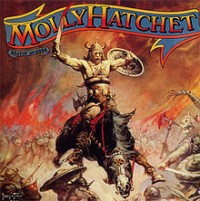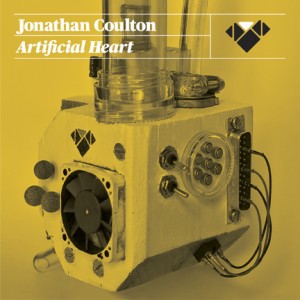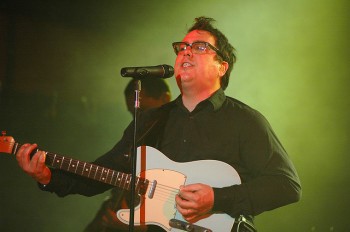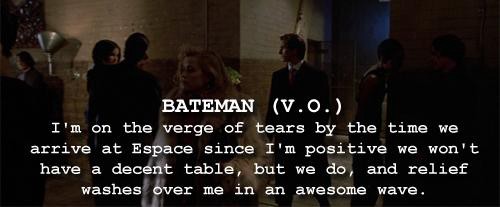Here Are 14 Kinds Of Nose

There are 14 types of Caucasian nose, according to an Israeli scientist, including the celestial (or turned-up), fleshy, Greek, Roman, snub, hawk, bulbous and bumpy. “The experiment even found a nose in Israel it considered extremely unique — and the only one of its type in nearly 1,800 pictures viewed.” What kind of nose do you have? Tell us in the comments!
Photo by Very Daily Photos Album
Let's Say the 'New Yorker' iPad Publication Makes $58K a Week

The data we’re allowed to have from places like Conde Nast makes it a little difficult to parse, but this helps: “between its eight magazines with tablet editions, the company has 242,000 digital customers.” Good night, nurse! Your revolution is… maybe next year? (That being said, I’d love to see income numbers from that. It’s gotta be somewhere from $1.2 million to $2.6 million, I figure? The problem is counting people who get iPad access “bundled” with magazine subscriptions; where people get counted is important!) And language is tricky!
But here’s what we can figure out. The New Yorker “served” 89,684 iPad copies for an issue in June. That number is obscured by “served” and doesn’t count people like me, who subscribe to the magazine but wouldn’t ever be bothered to crack it open on an iPad, but it does count… people who subscribe to the mag and then realize “Oh hey I can also get this on this pad-thing.” And it counts some number of people who just straight up buy it for the iPad — about 20,000 people, according to this typically listless bit of reporting — which, in some sense, is nice free money!
So by my very slightly charitable calculations (20,000 people at $59.99 a year, then 5000 people buying weekly issues), the New Yorker iPad publication brings in $58,073 a week. (That’s about $3 million a year. You could probably say it turns a profit!)
If You're Using Internet Explorer You Might Not Understand This Post

The fact that this article no longer appears on the Daily Mail’s website does not mean that this assertion is incorrect.
America Apparently All Out Of Options
Can Will.i.am Bring China and America Closer Together? Sure, why the hell not.
Welcome to Mute Nostril Agony: It's August

Hello. It’s August. When we know that, despite the fact that there is a large headline across the top of today’s New York Times, nothing ever happens.
This is a strange situation for a month with such a robust name. August! Named for a king, hinting of a strong wind, carrying portents of a heady future.
But no. There is not a strong wind. There is a hot, fetid calm. There are the doldrums.
True sailing is dead.
Ughh. True sailing is so totally dead. August passes sluggish and slow, weighed down by humidity and International Beer Day and too much goat cheese. Though, I guess, you know, there can be worse things. (Sometimes the month gets weighed down by nuclear warfare. Let’s hope not this year.)
Sometimes it’s as if August is actually moving backwards, creeping back in time to infect other months with its slack sails and unproductive laze. Certainly, the government has been dragging its feet. And getting nothing much done. Nothing much good, at least. For me, too, it’s felt like August for the past few weeks. I haven’t been able to get anything done except complain about the heat and the mosquitoes in Brooklyn and Massachusetts (where I went the weekend before this past one, and where the mosquitoes, I swear, are like fog.) And how they seem to be so much more attracted to me than to other people. And how much more their bites seem to itch me than they do other people. And how unsympathetic other people can be. And, while it’s maybe not as bad as nuclear bombs on Hiroshima and Nagasaki, it is pretty bad, man’s inhumanity to me.
And now we’re actually in August, so things are bound to get worse.
Oh! But you know what does actually happen this month? And it’s kind of perfect for a month when nothing actually happens, being that it involves so much beer drinking and the revving of thousands of motorcycle engines in idle, and being that it takes place in South Dakota: the world-famous biker rally at the Buffalo Chip campground outside the town of Sturgis. Some 500,000 people will enjoy a week of machine gun shooting and midget bowling and pickle-licking contests. And rock music. This years marks the 30th anniversary of the event at Buffalo Chip. And the schedule is impressive:
Edgar Winter
Alice Cooper
Bachman Turner Overdrive
Toby Keith
Ted Nugent
Styx
Def Leppard (Oh, and it’s Joe Elliot’s birthday today! He’s 52.)
I love that song.
Also playing:
Poison
Buck Cherry
Gregg Allman
Lynard Skynard
.38 Special
George Thorogood
Leon Russell
Molly Hatchet
And Academy Award winner Jeff Bridges, who has launched a music career in earnest and will be joined by John Fogerty and Stevie Nicks! Here is what the Buffalo Chip News says about Stevie:
“Nicks is sure to rev up the party for Chip goers. Embodying the characters of her songs, Nicks will take you on an arousing and enchanting escape into a world of white-winged doves, black widow spiders, and ‘sisters of the moon.’ Her captivating stage presence and powerful voice will rock the house.”
I’ll say!
Concurrently, at Cooper’s Lake Campground in Slippery Rock, Pennsylvania, the Society for Creative Anachronism will be holding its 40th annual Pennsic War. This war, as you know, gathers committed Renn Faire types from all over the world, 10,000 of them some years, in pitting the Kingdom of the East against the Middle Kingdom in a test of “chivalric combat of the highest.” (You saw Role Models, right? If not, please do. It’s a super-great movie.)
There some similarities between the two events. (The “nothing actually happens in August” thing being one such, which is not meant as slight. These are both worthy ways to spend time this month.) But there are some differences. For example, the Pennsic War website advises participants:
“If you don’t know what something is or if someone won’t tell you what something is, don’t drink it. Don’t drink anything that glows in the dark…”
But Stevie Nicks, being as magnificent as she is, and as universally appealing, could play both, I think. While an act like Molly Hatchet, say, could play Sturgis (in fact, I would think they’d be required to by law, absolutely each and every year), but just send their album covers over to the Pennsic War in tribute to the late, local, legend painter Frank Frazetta, who painted them. As the Pocono Record put it upon Frazetta’s death last year:
“He lived among dragons, battlefields and medieval landscapes. And in the end, he was master of them all.”
Oh Speidi! An Incredible Tale About the New Fame

Perhaps you don’t know or remember Heidi Montag and Spencer Pratt, because you “don’t have a TV” or because you, like, read books. They were, quite recently, the very picture of modern fame, having risen to attention on a semi-non-fiction TV show called “The Hills,” and they made a pretty decent fortune. And then they lost it all, and this account of their life after tabloid fame is actually incredible. What is my favorite part of this even! Hmm: “Heidi’s plastic surgeries gave her a distorted quality, but she vowed to have more. Spencer grew a thick beard, became obsessed with crystals, and was eventually told to leave the series.” OR: “By the time they announced they were (fake) splitting, followed by Spencer threatening to release various sex tapes, and Heidi (fake) filing for divorce, it seemed like they had ventured into, at best, Joaquin Phoenix-like, life-as-performance-art notoriety and, at worst, truly bleak Star 80 territory that could end with one or both of them dead.” At least they still have their incredible orthodontia though. That, at least, you can usually take with you.
In any event, I literally feel like this story deserves a Pulitzer Prize — mmm-hmm, I did so just say that — because it at last reveals the big lie of our time about the massive infotainment industrial complex, and about the people who are sold as products.
Your Knowledge Of Low Pressure Systems Is Outdated
Everything you think you know about low pressure systems is wrong. Do you hear me? WRONG!
A Conversation With John Flansburgh And Jonathan Coulton
by Chris Chafin

John Flansburgh is never at a loss for words. Well informed and quick with a funny line, he’s able to talk intelligently about pretty much any subject under the sun. He’s also, of course, spent more than 25 years writing witty and esoteric songs as one half of the band They Might Be Giants, along with John Linnell. This wry sensibility also made him a good fit to produce Artificial Heart, the new record from Internet favorite Jonathan Coulton. During his Thing A Week project a few years ago, Coulton wrote a song every week, covering everything from life in the suburbs to memos from zombies. He’s also Popular Science’s Contributing Troubadour and a frequent collaborator of John Hodgman’s. As producer, Flansburgh has overseen Coulton’s evolution from the guy-alone-with-a-guitar-while-the baby’s-asleep aesthetic of his earlier work to a more muscular, properly produced rock sound.
Over the weekend, They Might Be Giants played a free show along with Coulton at the Williamsburg waterfront. I sat down with Flansburgh and Coulton a few hours before the show in their shared trailer. TMBG’s side of the trailer, which was the larger half, was full of Christmas lights and at least a dozen people. We sat in Coulton’s half, next to a shrinkwrapped fruit plate and a plastic bucket of Vitamin Water. People from TMBG’s half of the trailer would occasionally wander in because they thought we were sitting in the bathroom.
How did you come to work together?
John Flansburgh: I heard about Jonathan Coulton through John Hodgman. I recorded this thing that’s on the John Hodgman book on tape [Areas of My Expertise] about Jonathan Coulton being irresponsible with cats.
Jonathan Coulton: It was an attack ad.
JF: And there was a long interval where all I knew was this sort of strange Hodgman hectoring. And then I heard that he was really good, and he should open for us.
You’ve both done a lot of high-profile work with other Johns. Narcissism or laziness?
JF: I think you have John Fitzgerald Kennedy to blame for that more than anyone else.
JC: First of all, my name is Jonathan.
JF: Oh, right, this is a thing for you.
JC: “John” is not an abbreviation for “Jonathan.” They are two different names, derived from different…
JF: One of them connotes nobility.
JC: I won’t say which one is the more, shall we say, common? But one of them is more special. My mother taught me early on that I should get very angry at anyone who calls me “Jon.” Because my father’s name is John, and my grandfather’s name is John. And mine is Jonathan.
JF: When I was in grammar school, there were seven boys in my class named John. There were like 13 boys, and a majority of them were Johns.
JC: Was it like “John S.,” “John F.”?
JF: Yeah. 1960 was a very dull year for names.

Tell me about producing Artificial Heart.
JF: When you’re producing somebody, it’s always an exploration as to how much they will rise to… how much you can up the ante. And the fact that you didn’t have a pre-conceived notion about your own limitations is actually a rare commodity. A lot of people feel like they only do one thing or a few things well, and they really want to stick to that, and they don’t really treat the process of putting an album together like it’s open-ended.
I saw this documentary about people in vaudeville, and the thing about vaudeville that people don’t realize is that it was all during the Depression, and a lot of the people in it didn’t really want to be in it, it was just a better gig than anything else they could be doing. So if they could cook up an act, they’d just stick with it. There was this kind of misery component to it — they were just stuck. I feel like a lot of songwriters, especially people who figure out one way of doing something that really clicks for them, all they do is grind away at doing that thing over and over again.
We’d try to figure out what makes a good album. It’s got scope, it’s got dynamics, it’s got quiet songs and loud songs and slow songs and fast songs, and different kinds of rhythms, different kinds of textures — the way that someone would think about an album like Revolver, or, I dunno, some Blind Faith album — the idea of making an album is about more than just making singles. I feel like you were up for the ambition of it, and most people aren’t.
Nobody reads a novel, and thinks, “The guy who wrote this must be a serial killer,” although maybe David Mamet has screwed that up.
I’ve read that TMBG was a major influence on you, Jonathan.
JF: I believe the quote was “We share a sensibility that they originated.”
JC: Did I say that? “We share a sensibility that they originated?” That is a strange thing for me to have said.
You’ve both had songs used as TV themes. What’s that like?
JC: My song “Code Monkey” was used as the theme for the G4 series “Code Monkeys.” You can imagine why.
JF: Do you get long envelopes every month from that?
JC: I get short envelopes. They did not commission me to write it, but they licensed it. The show was in development, and they called me. I think at first they asked me to change the lyrics to fit their characters, and I said, “Um, no thank you.”
But, you, that “Malcolm in the Middle” thing was a smash.
JF: It was, yeah. There are some things that make me very sad. The song is 33 seconds long; it was just rattling around in the half-written song pile, and we got called to do this demo for a pilot that hadn’t even been greenlit, so it was the most speculative thing imaginable. I remember getting the phone call, and it was from a guy named ‘Linwood Boomer.’ And my wife took the message, and I was like, “Okay, ‘Linwood Boomer’ is not actually a name.” It seemed like some kind of prank or something.
JC: It’s like a “Dukes of Hazzard” character.
JF: Like, “Would you write an original song for this thing, for no money, and it might not ever happen?”
JC: “YES!”
JF: “It’s a really tempting offer, but. . .” But then they actually offered us a small amount of money, so I took this pre-existing song, and I worked it up to be exactly 30 seconds long, but then after I had a little conference call with the show’s creator, Linwood Boomer, I said, “Can you sum up the idea of the show?” And he said the idea is that life is unfair. So I tacked that “Life is unfair” to the end of the song, and that made it 33 seconds long, which makes it the only theme in existence that breaks the 60–30–20 rule of theme lengths. But when they play it in syndication overseas, they just play it faster. They play it 10% faster, which is pretty significant, and it just sounds horrible. And it’s very jarring and kind of upsetting to hear it butchered that way. Although actually the first place they did it was in England, where it then instantly became like a top 20 hit.
They Might Be Giants also wrote some original songs for a Dunkin’ Donuts campaign back in 2006, right? Any thoughts on their recent IPO?
JC: I have a Dunkin’ Donuts right on the corner of the block where I live.
JF: I thought you said you have Dunkin’ Donuts right in the corner of your beard.
JC: I try to keep a little bit of donut on me at all times, if you know what I mean.
JF: I don’t understand how franchise restaurants work. Because there are hundreds of people who own franchises, so . . . aren’t they. . . you went to Yale. Aren’t they in some way owners of Dunkin’ Donuts?
JC: I think if you’re a franchise owner, you just license what you need to run the restaurant.
JF: They didn’t cover this on “Bewitched,” so. . .
JC: Listen, good for them. Honestly, I don’t like the coffee. Are you still beholden to Dunkin’ Donuts?
JF: The Dunkin’ Donuts ad campaign was the best gig of my life. We did, like, 20 TV spots, and a dozen radio spots, and each one was a different song. The main dude we worked with there was like such a cool guy, just absolutely a joy. I wish that would come back. I bought a car. I’d never bought a new car before.
JC: Take out that thing I said about the coffee, in case they want to hire me. I don’t know if you’ve heard, but we share a sensibility.

How do you feel about having your music categorized as “for geeks”?
JF: I think our take on this is almost the opposite of one another. When we’ve talked about it, you celebrate the idea of being like a spokesperson for the world of, uh, people who are… Internet savvy? You kind of wave that flag.
JC: They’re my people. It’s been a big part of where my success has come from. It has to do with the music I write, and the subject matter, and how I relate to the audience, and how the business works, and it’s all been very Internet-y, geek-centric for me. So, yeah, that’s definitely been a huge part of it. And I sort of identify as geek. Our friend John Roderick, who’s the singer for The Long Winters —
JF: That guy’s a geek. Just for the record, that’s a joke. He is a guy from Alaska who could snap you like a pencil.
JC: He’s a Sasquatch with a heart of gold. And the voice of an angel.
JF: And he has punched people in the face. I’m sure no one else in this room has punched people in the face.
JC: So, he went to Comic-Con, and it turns out he’s actually a big comic book nerd. And he was a little leery of the whole geek culture thing, because of late, it’s really become a thing that everyone talks about.
JF: It’s turned a corner?
JC: Yeah. He tweeted from the floor of Comic-Con, where he was buying comic books, “I just realized the word ‘geek’ has evolved such that it encompasses everyone and is completely meaningless.” That really resonated with me, and it put into words something that I’ve been thinking about for a long time. People mean all different things when they use the word ‘geek,’ and it’s become this large umbrella, and people misuse it, and use it as a cudgel, or as a private club —
JF: I don’t know what a ‘cudgel’ is.
JC: Or they use it, like, a secret tribe.
JF: I think that the secret power of the word ‘geek’ is that it has a celebratory aspect to it, at the word’s core. People who identify themselves as geeks are saying, “I am celebrating my personal obsessions.” And there’s nothing more powerful or independent among individuals than saying, “I don’t care what anyone else thinks, this is what I dig.”
I was 17 in 1977. I learned to play the guitar the same year that everyone else who liked punk rock learned to play the guitar. For me, when people say, “You guys are such nerds,” I am a million miles away from that. If it was not for the Sex Pistols and the Ramones and Patti Smith and Elvis Costello and the Tuff Darts and Mink DeVille and Pere Ubu and The Residents, I would not be in a rock band, because those things are my cultural lighthouses. Those people punched people in the face. There’s nothing in my background that’s about this kind of cozy highly modern thing.
JC: You are punk rock!
JF: But you know, every band on the Vans [Warped] Tour claims to be punk rock. I’m a child of punk rock, I’m a fan of punk rock. What we do is sort of different, but . . . the label thing, it might be negative, you might think of it as a diss. It’s easy to think of it as a diss. But at least it’s something apart from rock orthodoxy, which I think is infinitely more boring.
The idea that rock in 2011 is dangerous, is such a patently full of shit idea. You go into some Guitar Center, or to Los Angeles, where there’s a whole community of people who are professionally… they are styled to appear bad-ass. And I guess, if you just like that aesthetic, if you think that’s attractive, I guess I get it, people want to dress in appealing ways, but I just feel like as a lifestyle choice, there is nothing more thuddingly dull than dressing yourself up as a ‘rocker.’ There’s gotta be something else. You gotta do something else. Or just be yourself, or just give up, or whatever. Dress like your dad.
People mean all different things when they use the word ‘geek,’ and it’s become this large umbrella, and people misuse it, and use it as a cudgel, or as a private club.
Do you set out to be “funny” in your songs?
JF: The humor in music thing is such a strange and delicate problem for me.
JC: Well, it is. It’s a challenge.
JF: I find it a very hard balance to get right.
JC: If you decide to write a funny song, it sort of sets you back on your heels immediately. You have to climb out of that hole to write a good song.
I’ve written a lot of funny songs that are just sort of like “honka-honka!!” [clown horn noise], and they never go anywhere, and why would you ever care about that song, because it doesn’t say anything. I think it’s possible to make “funny” music or “quirky” music, although I hate that word.
When you’re evaluating an artist, and they do something quirky, the easy thing is to say, “oh, that’s a quirky song, that’s a novelty song,” and dismiss it. Whereas I think there’s a lot of meat on those bones. Sometimes.
JF: The strange this is that if you look at it through the other end of the telescope, if the songs are supposed to be funny, why aren’t they funnier? This is part of the sensibility that we share. The songs are designed to hold up to repeated listening. And actually, something we discussed while we were making the record is that a lot of things are interesting one time. If you really are in the business of serious songwriting, you got to make something that really holds up. And that doesn’t mean that you can’t have a humorous sensibility, but you also have to have another layer to it that keeps on giving up good stuff for the listener.
An emotional core?
JF: No. I want to be quite specific. I don’t think it’s a matter of having heart. If you talk to people who work on Broadway in musical comedy, they’re always saying, “The songs are really funny, but they’re good because they have heart. “ And I actually think that heart is completely overrated. I think Bertolt Brecht is a lot more interesting than a lot of musical comedies. I think he’s also more funny than a lot of things in musical comedies. I mean, Shakespeare’s funny. A lot of things are funny.
JC: You think Shakespeare doesn’t have heart?!
JF: I think anything that’s sharply written can have that kind of edge and still give up more stuff. And maybe it’s not about heart, but it’s about ideas, or making you hear something in a different way. There’s this idea in Bertolt Brecht called “V Effect.” Have you ever heard about this?
JC: No, I have no idea what that is.
JF: It’s an alienation effect. Like, in the middle of the performance, they’ll put something in to remind you that you’re just watching a show. And I think that idea echoes through a lot of contemporary songwriting. In our sensibility, where we will suddenly pull out the fourth wall and be like, “We’re right here.” I think a lot of the performance aspect of what we do is about that sharp shock of just finding out that there are different levels of what’s going on. There’s a communal level, a literary level, a personal level. I feel like this kind of writing and performing at its best gets at something that’s normally found more in prose. Nobody reads a novel, and thinks, “The guy who wrote this must be a serial killer,” although maybe David Mamet has screwed that up. They know that the author is working to push ideas to extremes. We talk a lot about unreliable narrators and trying to push the point of view beyond just first person singular singer-songwriter stuff. It can be done. The popular song is not over. It’s not like all the good songs have been written and we’re just going to write some more because we like songs. There’s a future there. And if you really think about it, you can do some good stuff.
JC: It’s hard, though. You have to work hard at it.
JF: It’s really hard.
JC: You have a very powerful bullshit detector as far as lyrics go. Part of the process I loved was that I’d send you a song, and you’d say, “This is good, but this line feels sort of phoned in” or “This line feels sort of outside of what’s going on,” and you were always right. You were always right. And I wouldn’t see it until you said it.
JF: I hope there are some superstar acts reading this, because I need to get some more work.
JC: All that stuff you just said about Brecht, I mean, I went to Yale and I have no idea what you’re talking about. You’ve obviously thought a lot about it, and it was great to be able to tap into that thing that you have.
JF: Well, that’s the function of a producer: to be your first audience. To be the guy who says, “You might not really understand how this is going to land, but just tweak this a little bit.” You can make it seem like it’s a really big thing, but it’s a lot more like being a tailor. I mean, I didn’t write those songs.
JC: You would say, “Take this word in this verse, and switch it with every occurrence of that word in that other verse.” And literally you suggested I do that in one song, and it was a brilliant piece of poetic mumbo-jumbo.
JF: It was a good day at the office.
Chris Chafin writes for a few places about things you can listen to, play or consume. Here’s his Tumblr, which isn’t super compelling.
Interview condensed, edited and lightly reordered.
Photo of Flansburgh by Carl Lender; photo of Coulton by Vivan Jayant.
The Five Stages Of Grief, In Order Of Persistence And Intensity

5. Acceptance
4. Anger
3. Bargaining
2. Denial
1. Depression

